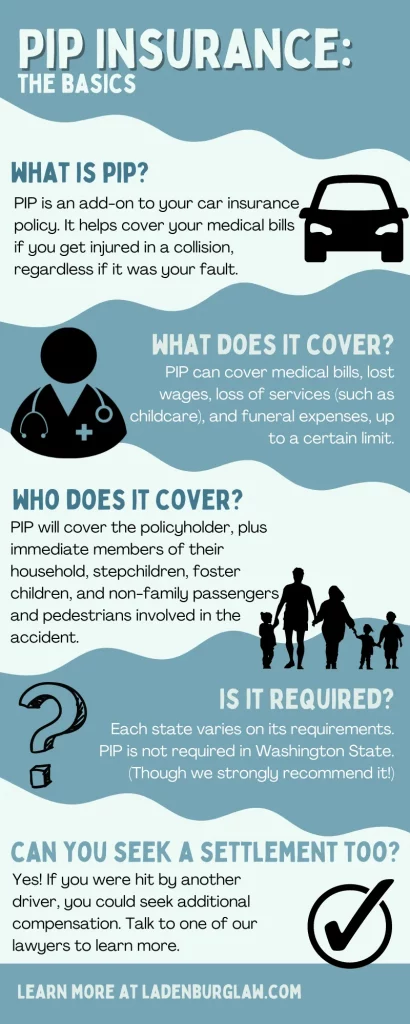Free Case Evaluation
(253) 272-5226Free Case Evaluation
(253) 272-5226If you are a motorist in Washington State, you are required to have auto insurance. But there’s an optional extension called Personal Injury Protection (“PIP”) that you can add on. And it’s possible you already have PIP, whether or not you realize it. PIP provides valuable benefits to policyholders for relatively few dollars per month.
Let’s look at bit closer at what this useful protection can do for you in the unfortunate event of an accident.
PIP is an add-on to your car insurance policy that will cover your immediate medical costs after an auto accident, whether or not you’re at fault.
The benefit is that you have quick access to funds from your own insurance company to pay for doctor and hospital care, without having to wait for the other driver’s insurance policy to kick in. Even better, there are no deductibles or copays to worry about when it comes to PIP.
PIP is applied after any medical insurance you have. This means your out-of-pocket costs are going to be reduced even further.
Currently, there are 15 states in the country that require motorists to have PIP, but Washington is not one of them. But all insurance carriers must offer PIP coverage to motorists. If you choose to decline it, you must do so in writing. Otherwise, your insurance carrier will add it to your policy and charge you for it. In fact, it’s quite possible that you already have (and are paying for) PIP if you don’t remember taking this step!
The simplest way to know if you have PIP insurance is to pull out a copy of your auto insurance policy declarations page. If you see a line item called “Personal Injury Protection,” you’ll know you have it. Still not sure? Give your insurance agent a ring.
PIP covers the policyholder, plus the following:

Think of PIP as covering people, not property. There are four things PIP can cover, depending on your claim:
It’s important to note that PIP will cover these costs so long as they are directly related to the accident and that they are reasonable. Further, your PIP policy will only pay the amount of costs incurred, regardless of policy limits. For instance, suppose your doctor bills following an accident totaled $1,500. In this case, PIP will cover the $1,500, even if your policy limit is $10,000.
No; PIP coverage is intended to provide coverage for medical and other essential expenses directly related to your accident. If another driver caused your accident, you could file a personal injury claim against their insurance carrier. A settlement from their policy could cover non-economic damages, which includes things like pain and suffering.
There are certain situations when your PIP insurance will not kick in. If it turns out that you were committing a felony or participating in racing activities during your accident, PIP won’t cover you. (There are a few other specifics, which you can read at RCW 48.22.090.)
Also, PIP won’t cover if you if your injuries were caused by using:
In some cases, you can purchase PIP on your motorcycle insurance policy. However, don’t be surprised by the high cost.
In Washington State, PIP will pay for expenses up to three years after the accident. Of course, you’ll want to notify the insurance company as soon as possible after the accident to start the claim process. If you wait too long to report the accident, you may be denied coverage. Make sure to keep all relevant records and bills associated with your claim.
If you end up needing to file a PIP claim, you might hear the term “PIP subrogation.” While that’s a fancy term, the definition is pretty simple.
Let’s say the other driver was at fault for your accident. You need medical care, so your PIP kicks in. Afterwards, your PIP carrier may go after the other driver’s insurance carrier for reimbursement. This could impact the final settlement amount you receive.
MedPay has many similarities to PIP. It’s an optional, first-party coverage motorists can add to their policy. MedPay provides immediate coverage for medical expenses after an accident, regardless of fault. However, it only covers medical expenses. PIP, on the other hand, also covers a few additional expenses such as missed work, daycare, and other essential services. When deciding on your auto policy, make sure to discuss your needs and budget with your insurance agent.
In Washington, you are not barred from filing a lawsuit against the at-fault driver, even if you have PIP. PIP is designed to provide quick access to funds for less serious accidents. Remember, most PIP policies have a limit of $10,000 in medical expenses. It’s very easy to rack up charges much greater than this if you end up in the ER or need a hospital stay. For this reason, you may need to pursue a settlement from the at-fault driver’s insurance company.
And, as quick and easy as PIP sounds, in our experience, some carriers will do all they can to deny claims. For this reason, we always recommend you give us a call to discuss your case. We are able to assist residents in the greater Western Washington area and are pleased to offer an initial consultation at no cost. Call Ladenburg Law today.